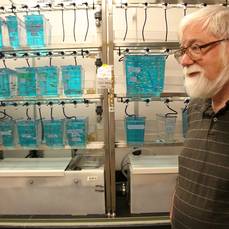technology

Anant Agarwal, the president of EdX- Harvard, and MIT's $60 million online learning venture, is a bit of a rock star.
Last year, Agarwal taught EdX's first massive open online course (MOOC), a course on circuits and electronics. Like all MOOCs, it was posted online for free.
"I was hoping for a sweet spot, a total of about 2,000 students. I figured if we had 200 students, that's as much as a campus class. That would be embarrassing."
But what Agarwal and his colleagues didn't figure was the worldwide demand for free, online MIT engineering courses.
"We had 10,000 students sign up in the first few hours of making the course open," Agarwal said. "So that was the first heart attack. Then, as the numbers kept rising and began approaching 100,000, then it was panic time. So we were wondering, 'How on Earth are we going to support this many students?'"
Agarwal is among those in higher education who believes it's important for people around the world to have access to a great education, but is EdX disrupting the higher ed market by giving away knowledge for free?

Since Amherst College decided not to join EdX, more and more colleges and universities have signed up, hoping to put their own courses online. But bubbling under this debate are questions about the quality of online learning and whether credits should be issued.
Fueling the debate is a recent survey produced by The Chronicle of Higher Education: Nearly three quarters of professors who teach these free online courses don't think their students should get credit as they would in a face-to-face class.
Massive open online courses, or MOOCs — the fast-growing movement to put higher-education courses online for free, have gotten the attention of President Obama.
"Universities like Carnegie Mellon, Arizona State, they're starting to show that online learning can help students master the same material in less time and often at lower costs," Obama said recently.
But the jury is still out on the effectiveness of online courses: Are they worth the hype or a passing fad?
Administrators at the Massachusetts Institute of Technology say the prestigious university didn’t target Internet activist Aaron Swartz after he was charged with hacking into MIT’s network.
MIT’s internal review released Tuesday supports the school’s position that it didn’t do anything wrong.
At 26-years-old, Swartz was facing federal prosecution and up to 30 years in prison for using a laptop to download millions of articles from the digital archive called JSTOR.
The Internet activist wanted to make those articles widely available to the public.










